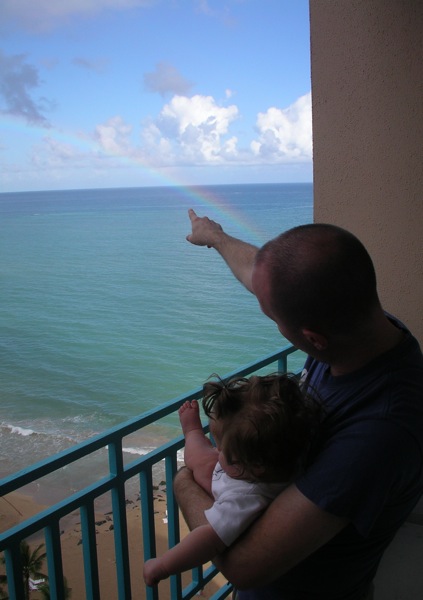21 February 2011 to 20 December 2007 · tagged child
It is late February, 2011, and my daughter Lyra is not yet 4. She has been an actual person for a very long time, of course, but I would like to state, for the record, that I feel like some sort of threshold was crossed this evening while she and I were playing The Light Asservancy Game, and she is now not only an actual person, but an actual person I do not expect to ever again claim to entirely understand.
The Light Asservancy Game is called that because that's what Lyra said it is called, although having done so she now denies that this is its name, and insists instead that it has some other name which she has never mentioned because she has forgotten it. What word she meant "Asservancy" to be, if indeed she meant something else, I have not the slightest idea.
The Light Asservancy Game is a kind of nihilist parody of a Socratic dialogue, played by two people taking two nominally oppositional roles known as "The One Who Says the Lights Are On" and "The Other One". A round is traditionally begun by The One Who Says the Lights Are On, usually by saying "The lights are on!" There are no specific requirements after this point, but it is the general task of The Other One to methodically, impluasibly and with self-certainty of ever-increasing scope, deny the existence of commonplace ideas and elements of reality. E.g.: "The lights are not on." "Yes they are!" "No, and what's more, there are no such thing as lights." "Yes there are, there're some right there!" "No, there is no such thing as light. There is only eternal, all-encompassing darkness." "But there are flashlights!" "No, there are only flashdarks, and all they do is add even more darkness to the total completeness darkness that already fills every inch of the universe." "There's not darkness in every inch!" "Yes, and silence. Pitch-black silence that swallows every possible word or thought." "That's not right!" "It is. And there's no use trying to argue, because there are no words, and no language, and thus you can't possibly say anything." "Yes I can!" "No. And even if you could, there's nobody to hear it, because there are no people." Etc., etc.
There is a soothing rhythm to this, as long as repeated insistence on the immance of the yawning void counts as "soothing" to you. We have played this game for rather extended periods, with a three-year-old's giddy enthusiasm for escalating repetition, long enough a couple times for me to get a little worried that I might be really upsetting her with the extremes of abnegation, but each time I have tried to stop, she has instantly switched out of character and indignantly demanded that I go back to playing the game correctly.
The fact that she enjoys this game, in the first place, is inexplicable and wonderful, but the thing that completely dumbfounded me, as we were playing just now while getting ready for bed, was that in a lull she suddenly insisted on switching roles, and for the first time she played The Other One. "The lights are on", I said. "There's no such thing as lights!" "What? What are you talking about? There are two lights right there in your bedroom, and two more in the bathroom." "No there aren't! There are no such thing as rooms!" And off we plunged, into abysses entirely of her devising.
Maybe it's just a word game, and maybe she doesn't genuinely, deeply, understand the philosophical ramifications of asserted non-existence. But maybe that's true of me, as well. I can't always explain what I mean by the things I believe I believe or disbelieve, myself. But I wake up, every morning, excited to find out what either -- any -- of us have adopted or abandoned anew.
[4/10 Postscript: We've continued playing this game, and I always enjoy it, but it reached a new level this afternoon when, in the middle of a random bus ride, Lyra turned to me with a half-hysterical smile and said "Daddy! There's no such thing as the Light Asservancy Game!" I'm not at all sure what I have left to teach her.]
The Light Asservancy Game is called that because that's what Lyra said it is called, although having done so she now denies that this is its name, and insists instead that it has some other name which she has never mentioned because she has forgotten it. What word she meant "Asservancy" to be, if indeed she meant something else, I have not the slightest idea.
The Light Asservancy Game is a kind of nihilist parody of a Socratic dialogue, played by two people taking two nominally oppositional roles known as "The One Who Says the Lights Are On" and "The Other One". A round is traditionally begun by The One Who Says the Lights Are On, usually by saying "The lights are on!" There are no specific requirements after this point, but it is the general task of The Other One to methodically, impluasibly and with self-certainty of ever-increasing scope, deny the existence of commonplace ideas and elements of reality. E.g.: "The lights are not on." "Yes they are!" "No, and what's more, there are no such thing as lights." "Yes there are, there're some right there!" "No, there is no such thing as light. There is only eternal, all-encompassing darkness." "But there are flashlights!" "No, there are only flashdarks, and all they do is add even more darkness to the total completeness darkness that already fills every inch of the universe." "There's not darkness in every inch!" "Yes, and silence. Pitch-black silence that swallows every possible word or thought." "That's not right!" "It is. And there's no use trying to argue, because there are no words, and no language, and thus you can't possibly say anything." "Yes I can!" "No. And even if you could, there's nobody to hear it, because there are no people." Etc., etc.
There is a soothing rhythm to this, as long as repeated insistence on the immance of the yawning void counts as "soothing" to you. We have played this game for rather extended periods, with a three-year-old's giddy enthusiasm for escalating repetition, long enough a couple times for me to get a little worried that I might be really upsetting her with the extremes of abnegation, but each time I have tried to stop, she has instantly switched out of character and indignantly demanded that I go back to playing the game correctly.
The fact that she enjoys this game, in the first place, is inexplicable and wonderful, but the thing that completely dumbfounded me, as we were playing just now while getting ready for bed, was that in a lull she suddenly insisted on switching roles, and for the first time she played The Other One. "The lights are on", I said. "There's no such thing as lights!" "What? What are you talking about? There are two lights right there in your bedroom, and two more in the bathroom." "No there aren't! There are no such thing as rooms!" And off we plunged, into abysses entirely of her devising.
Maybe it's just a word game, and maybe she doesn't genuinely, deeply, understand the philosophical ramifications of asserted non-existence. But maybe that's true of me, as well. I can't always explain what I mean by the things I believe I believe or disbelieve, myself. But I wake up, every morning, excited to find out what either -- any -- of us have adopted or abandoned anew.
[4/10 Postscript: We've continued playing this game, and I always enjoy it, but it reached a new level this afternoon when, in the middle of a random bus ride, Lyra turned to me with a half-hysterical smile and said "Daddy! There's no such thing as the Light Asservancy Game!" I'm not at all sure what I have left to teach her.]
Recognition: "Pitatoes!"
Speculation: "Lyra have pitatoes?"
Direction: "Lyra have pitatoes on OWN PLATE!"
Clarification: "Lyra have pitatoes on own LITTLE plate RIGHT NOW!"
Description: "Taste like bannas!"
Extrapolation: "Daddy's pitatoes taste like bannas?"
Invention: "Lyra make more pitatoes in da PLATE!" (Stirs remaining sweet potatoes vigorously.)
Context: "Chicken TOO BIG! CUT IT!" (Small piece of chicken is bisected; both halves are immediately crammed in mouth at once.)
Misdirection: "Affer dinner, have yogit pop OUTSIDE?"
Capitalization: "ALL DONE WIF DINNER!! Have yogit pop OUTSIDE!"
Speculation: "Lyra have pitatoes?"
Direction: "Lyra have pitatoes on OWN PLATE!"
Clarification: "Lyra have pitatoes on own LITTLE plate RIGHT NOW!"
Description: "Taste like bannas!"
Extrapolation: "Daddy's pitatoes taste like bannas?"
Invention: "Lyra make more pitatoes in da PLATE!" (Stirs remaining sweet potatoes vigorously.)
Context: "Chicken TOO BIG! CUT IT!" (Small piece of chicken is bisected; both halves are immediately crammed in mouth at once.)
Misdirection: "Affer dinner, have yogit pop OUTSIDE?"
Capitalization: "ALL DONE WIF DINNER!! Have yogit pop OUTSIDE!"
Lyra was supervising while I cooked dinner tonight, and I gave her a few chickpeas as I was putting them in a salad, mostly because it's so irresistibly cute to hear her call them "bickies".
"Moh?", she said, with a cartoonish upward lilt as if she read in a guidebook that that's how you ask for something in grownup. This means "more", in this case "more chickpeas?". Never mind how I know this. Parenting skills.
"I'm making yummy dinner", I pointed out, reasonably. I'm a fairly reasonable person, which I think she appreciates. Or will, by the time she's 36 or so.
She considered this for a moment, pressing a tiny finger into the dot of bickish water the last chickpea left behind on her tray, then looked up again, a tiny easy-bake-oven light-bulb clicking on above her head.
"One?"
"One? You want one chickpea?" I said. I'm assuming that my habit of asking her for clarification will become decreasingly inane as time goes on. She nodded enthusiastically. You might think, from the time-ordering, that she was answering my question, but I've conducted tests, and it turns out that she nods no matter what you say. The nodding is her answer to the implied question "Do you still want whatever you wanted before?" Which is, to be fair, what most of our questions to her amount to.
"Well, I can hardly deny you one single chickpea." It's OK to indulge children as long as they understand the careful logic behind your actions. I plucked a chickpea off the top of the salad and centered it precisely on the tray in front of her. "One", I explained, pointing to it for helpful pedagogical emphasis.
She nodded three or seven times, then picked up the chickpea, crammed her whole fist into her mouth, somehow extracted the chickpea from her grip while her hand was inside her mouth, and then pulled her hand out with that great sweeping flourish she's been working on in case she ends up needing a career in rodeo. I turned back to the stove, wondering whether you can say that you've learned to count "to" one. It's kind of "from" one, really.
Behind me I heard a small finger tap a plastic tray once, moistly.
"Five?", she said.
"Moh?", she said, with a cartoonish upward lilt as if she read in a guidebook that that's how you ask for something in grownup. This means "more", in this case "more chickpeas?". Never mind how I know this. Parenting skills.
"I'm making yummy dinner", I pointed out, reasonably. I'm a fairly reasonable person, which I think she appreciates. Or will, by the time she's 36 or so.
She considered this for a moment, pressing a tiny finger into the dot of bickish water the last chickpea left behind on her tray, then looked up again, a tiny easy-bake-oven light-bulb clicking on above her head.
"One?"
"One? You want one chickpea?" I said. I'm assuming that my habit of asking her for clarification will become decreasingly inane as time goes on. She nodded enthusiastically. You might think, from the time-ordering, that she was answering my question, but I've conducted tests, and it turns out that she nods no matter what you say. The nodding is her answer to the implied question "Do you still want whatever you wanted before?" Which is, to be fair, what most of our questions to her amount to.
"Well, I can hardly deny you one single chickpea." It's OK to indulge children as long as they understand the careful logic behind your actions. I plucked a chickpea off the top of the salad and centered it precisely on the tray in front of her. "One", I explained, pointing to it for helpful pedagogical emphasis.
She nodded three or seven times, then picked up the chickpea, crammed her whole fist into her mouth, somehow extracted the chickpea from her grip while her hand was inside her mouth, and then pulled her hand out with that great sweeping flourish she's been working on in case she ends up needing a career in rodeo. I turned back to the stove, wondering whether you can say that you've learned to count "to" one. It's kind of "from" one, really.
Behind me I heard a small finger tap a plastic tray once, moistly.
"Five?", she said.
My daughter has just discovered indefinite articles. For the past couple days, every "Mommy" and "Daddy" and "Kitty" has turned into "A mommy!", "A daddy!", "A kitty!" I think it's probably overanalyzing to think that she has just grasped either existential quantification or classification, but clearly she means something. She has been meaning things for a while, too, of course, but it's possible that this is her first communicated abstract idea. And even if this isn't, yet, it makes me realize that something soon will be.
It's easy enough to see that a baby is a small person, taxonomically, because that's what they basically look like. But it's quite another leap to comprehend that an individual baby is actually inexorably becoming an individual person.
It's easy enough to see that a baby is a small person, taxonomically, because that's what they basically look like. But it's quite another leap to comprehend that an individual baby is actually inexorably becoming an individual person.
¶ A Short Story · 8 November 2008 child/photo
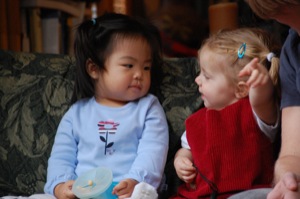
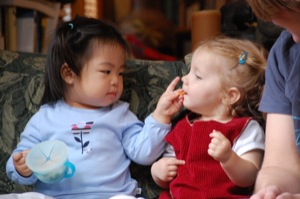
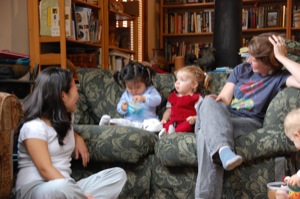
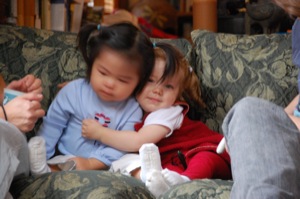
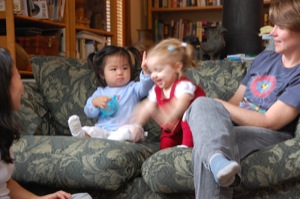
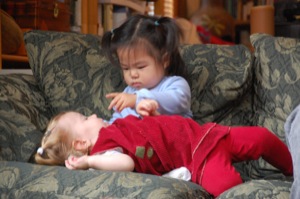

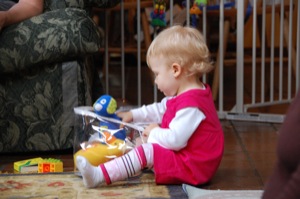


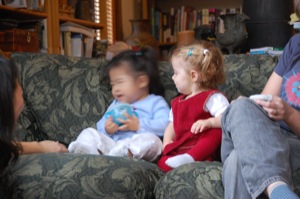
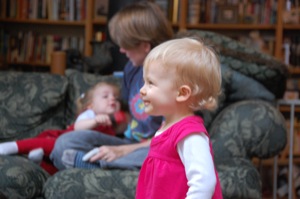
¶ 13 October 2008 child/photo

When she thinks she's alone, my daughter practices air guitar.
¶ The Case for Teaching Machines to Understand English · 27 June 2008 child/tech
Applied natural-language-processing work is motivated by the proposition that it's more practical to teach a few computers to understand human languages than it is to teach a lot of people (including every new one) to speak computer languages. The potential advantage, thus, is numeric and large.
So far, though, many people have learned to speak computer languages pretty well, and no computers have learned to understand human languages. Indeed, at this point it's still faster to teach computer languages to humans even if you have to create the humans from scratch first...
So far, though, many people have learned to speak computer languages pretty well, and no computers have learned to understand human languages. Indeed, at this point it's still faster to teach computer languages to humans even if you have to create the humans from scratch first...
¶ Three From One · 5 May 2008 child/photo
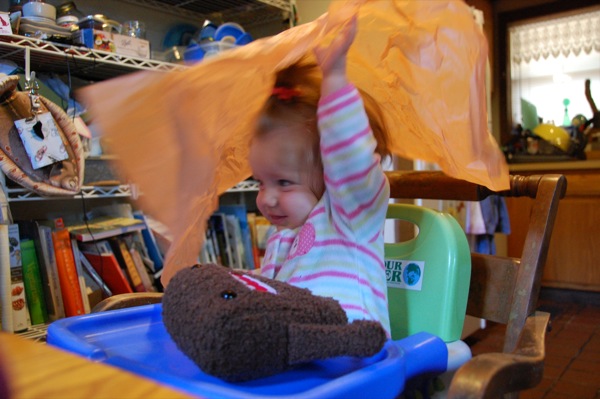


You were eating pieces of cereal, I was rounding up the ones that got away from you. I leaned over to brush a few closer, and you looked at me, reached up, and put one in my mouth. Not your first gift to me, by any means, but maybe the first you picked yourself. And so nowhere near the first time I am thankful in your presence, but maybe the first thanks to go simply between us, not everywhere around us.

